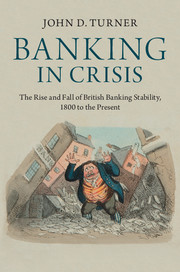Book contents
- Frontmatter
- Contents
- List of figures
- List of tables
- Acknowledgements
- 1 Introduction: Holding shareholders to account
- 2 Banking instability and risk shifting
- 3 The evolution of British banking structure and stability since 1800
- 4 Major and minor British banking crises since 1800
- 5 Banking stability, shareholder liability and bank capital
- 6 Averting or creating banking crises? The lender of last resort and bank rescues
- 7 Banking stability and bank regulation
- 8 Restoring banking stability: Policy and political economy
- Bibliography
- Index
1 - Introduction: Holding shareholders to account
Published online by Cambridge University Press: 05 July 2014
- Frontmatter
- Contents
- List of figures
- List of tables
- Acknowledgements
- 1 Introduction: Holding shareholders to account
- 2 Banking instability and risk shifting
- 3 The evolution of British banking structure and stability since 1800
- 4 Major and minor British banking crises since 1800
- 5 Banking stability, shareholder liability and bank capital
- 6 Averting or creating banking crises? The lender of last resort and bank rescues
- 7 Banking stability and bank regulation
- 8 Restoring banking stability: Policy and political economy
- Bibliography
- Index
Summary
But we know that generations do not always act upon the experience of their predecessors. There are periods of confidence in which all ordinary maxims of prudence are neglected…and all banking is in its very nature liable to abuse.
Thomas TookeLooking to the past
My first introduction to banking was playing Monopoly, the popular board game, with my siblings on rainy Sunday afternoons in the early 1980s. I learned two things from Monopoly. First, if one wished to mortgage property, the bank would advance no more than 50 per cent of the property’s value. In other words, the loan-to-value ratio was 50 per cent. Second, the banker, usually my brother, had to be constrained from cheating via a combination of monitoring, punishment and appropriate incentives. Fast-forward several decades and real British banks were granting mortgages with loan-to-value ratios of up to 125 per cent and British bankers, instead of being constrained to behave prudently and cautiously, were incentivised to increase bank leverage and take imprudent risks with other people’s money. The lessons of my youth suggested that such a system was doomed to implode, which it duly did in spectacular fashion in the autumn of 2008.
The portents of the collapse of the British banking system, as well as the breakdown of the banking system in the United States and in European economies, appeared in the summer of 2007, when banks ceased lending to one another. By September 2007, Northern Rock was receiving emergency loans from the Bank of England and facing depositor runs, with long queues of depositors outside many of its branches shown on BBC news broadcasts. It took an announcement by Alastair Darling, the Chancellor of the Exchequer at the time, of a taxpayer guarantee for all of Northern Rock’s deposits and various wholesale liabilities to bring the run on the Rock to an end.
- Type
- Chapter
- Information
- Banking in CrisisThe Rise and Fall of British Banking Stability, 1800 to the Present, pp. 1 - 14Publisher: Cambridge University PressPrint publication year: 2014



